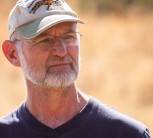The reality of rhino poaching has made us all too aware of the fragility of the species. It is with growing frequency that veterinary professionals are required to work on these animals in an attempt to save them.

Professor Leith Meyer has been doing research at the University of Pretoria (UP) for 12 years. He completed his undergraduate studies at UP’s Faculty of Veterinary Science in 2000, and joined the University of the Witwatersrand in 2003 as a lecturer in physiology. After two years, he was appointed as a research officer in Wits University’s Brain Function Research Group at the School of Physiology. During that time, Prof Meyer became particularly involved in the group’s research on wildlife environmental physiology and the consequences of game capture. In 2010, he obtained a PhD from Wits that focused on the reduction of the side-effects of capture.
Through his research, Prof Meyer aims to improve the welfare and conservation of various wildlife species. Within his academic discipline, he leads research that seeks a better understanding of the physiological consequences of veterinary management procedures, particularly when animals are captured, translocated, reintroduced into a habitat, rehabilitated or anaesthetised.
“Wildlife vets and managers play a key role in conservation programmes; my work helps these professionals to improve the health and welfare of wildlife species when they work with them,” Prof Meyer says. “My primary research interest and focus is to find novel ways of reducing the side-effects of wildlife capture, anaesthesia and translocation to improve animal health and welfare. We are working on several studies involving a number of different wildlife species, with a focus on rhinos.”
A recent highlight of his research was the discovery that one of the key drugs used to dart wildlife, especially rhinos, causes the activation of the animal’s stress pathways. This activation negatively affects these animals by making them hypermetabolic and hinders oxygen from entering their bodies through the lungs.
“We recently started a study to test novel drugs that can block these effects, with initial promising findings,” Prof Meyer explains. “We’re hoping to discover ideal drug combinations that can best prevent these adverse effects and make capture and anaesthesia safer for wildlife.”
He hopes that his work will have a positive impact on conservation, and improve the way in which wildlife vets handle and look after wild animals in the face of rapidly declining biodiversity. The changes in the world are making the conservation of nature challenging, with human interventions becoming more and more important, he adds.
Prof Meyer’s advice to school learners or undergraduates who are interested in his field is to stick to their dreams if they are passionate about becoming a wildlife vet and making a difference.
“It is an exciting and important field to be involved in, but hard work, dedication and commitment are required.”
 Story
Story
This edition is curated around the concept of One Health, in which the University of Pretoria plays a leading role globally, and is based on our research expertise in the various disciplines across healthcare for people, the environment and animals.
 Story
Story
A new study by researchers at the University of Pretoria (UP) and the University of Adelaide in Australia has revealed the real function of the giraffe’s long legs ¬– to reduce blood pressure.
 Infographic
Infographic
This infographic explains the long and short of a giraffe's legs. By having long legs, the giraffe is able to reduce the pressure it needs to get blood to its brain, thereby saving the animal energy.
Copyright © University of Pretoria 2025. All rights reserved.
Get Social With Us
Download the UP Mobile App